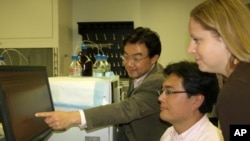Researchers used a substance, made naturally in the body, to reverse diabetes in mice, a finding which could be key to rolling back Type 2 diabetes.
The enzyme, called NMN (nicotinamide mononucleotide), restored normal blood sugar metabolism in diabetic laboratory mice.
Washington University medical school Professor Shin-ichiro Imai, focuses his research on aging and longevity. "And we have been focusing on a very interesting protein called SIRT1."
That protein is known to help combat age-associated diseases, including Alzheimer's and Type 2 diabetes. SIRT1 depends on a molecule called NAD (Nicotinamide adenine dinucleotide), and NAD, in turn, depends on NMN.
So Imai and his colleagues wondered if NMN might, in effect, help restore normal blood sugar metabolism. Using laboratory mice, they injected the animals with NMN in the hope of boosting the SIRT1 protein.
"We found out that NMN, in some cases, almost completely normalized their problems in Type 2 diabetes, especially in the females," he says.
According to Imai, the effect is much stronger in female mice than in the males, which is a mystery.
"There seems to be a significant sex difference in terms of the effect of NMN, and we still don't understand why."
So, does this NMN therapy amount to a cure for diabetes in the laboratory mice?
"At this moment, I wouldn't say 'cure,'" Imai says, "but now I'm sure that we can significantly improve their symptoms, so the question is, can we treat humans, can we treat Type 2 diabetes patients with NMN."
Toward that end, the researchers have begun tests, again with laboratory mice, to investigate the result of long-term treatment with NMN. If all goes well, human trials could follow.
Shin-ichiro Imai and his colleagues published their findings in the journal Cell Metabolism.




